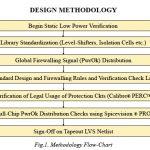You are currently viewing SemiWiki as a guest which gives you limited access to the site. To view blog comments and experience other SemiWiki features you must be a registered member. Registration is fast, simple, and absolutely free so please,
join our community today!
The building blocks for every SoC are standard cell libraries that are assembled, designed and verified together. But how do we really know if all the data formats used during design are correct and consistent? To answer that question I spoke with Johan Peetersof Fractal Technologiesat DAC.
Johan Peeters, Rene Donkers
… Read More
The smaller the process node the more necessary it is that you extract accurate parasitics from interconnect and 3D structures in order to analyze timing, thermal effects and ESD compliance. Silicon Frontlinehas EDA tools in all three of these categories, so I met with Dermott Lynchat DAC to get an annual update.
Dermott Lynch,… Read More
I first met Michael Munseyback at Viewlogic in the 1990’s, so was pleased to meet with him at DACand get an update on what Dassault Systemes has to offer the EDA world.
Michael Munsey, Dassault Systemes
… Read More
With EDA tool development in San Jose, Beijing and China, ProPlusis probably best known for their device modeling software called BSIMProPlus. At DAC I met with Lianfeng Yang, Ph.D. the VP of Marketing to hear about what’s new.
Lianfeng Yeng, ProPlus
… Read More
I’m keenly interested in SPICE circuit simulators, so at DACI met with John Piercefrom Cadence to get an update on what’s new this year.
John Pierce, Cadence
… Read More
If you’re involved with AMS or transistor-level IC design then having visual tools will help you design and debug quicker. At DAC I met with Gerhard Angst, President and Founder of Concept Engineering to get an update.
Gerhard Angst (center), Concept Engineering… Read More
ASIC prototyping from multiple vendors using FPGA boards was popular at DAC again this year in Austin, Texas. I stopped by the Tektronix booth for a few minutes to meet with Dave Orecchio to get an update.
Dave Orecchio (right), Tektronix… Read More
Synopsys has been acquiring EDA and IP companies at a fast clip over the past few years and it’s often made me wonder how they are going to craft a coherent tool flow for custom IC design. At DACthis year I learned that for schematic capture the winning tool is Custom Designer SE– a relatively new tool, while the IC layout… Read More
IC designer Shubhyant Chaturvediof AMD used EDA tools from Mentor Graphicsand Concept Engineeringto perform static, low-power verification of a mixed-signal SoC design with a combined CPU and GPU. Shubhyant presented a poster session at DAC two weeks ago in Austin, and I wanted to share it with my readers here at SemiWiki.… Read More
There were a handful of EDA vendors at DAC this year touting tools for IC variability analysis. On Tuesday I met with Firas Mohamed, CEO and President of Infiniscale.… Read More





















The Name Changes but the Vision Remains the Same – ESD Alliance Through the Years